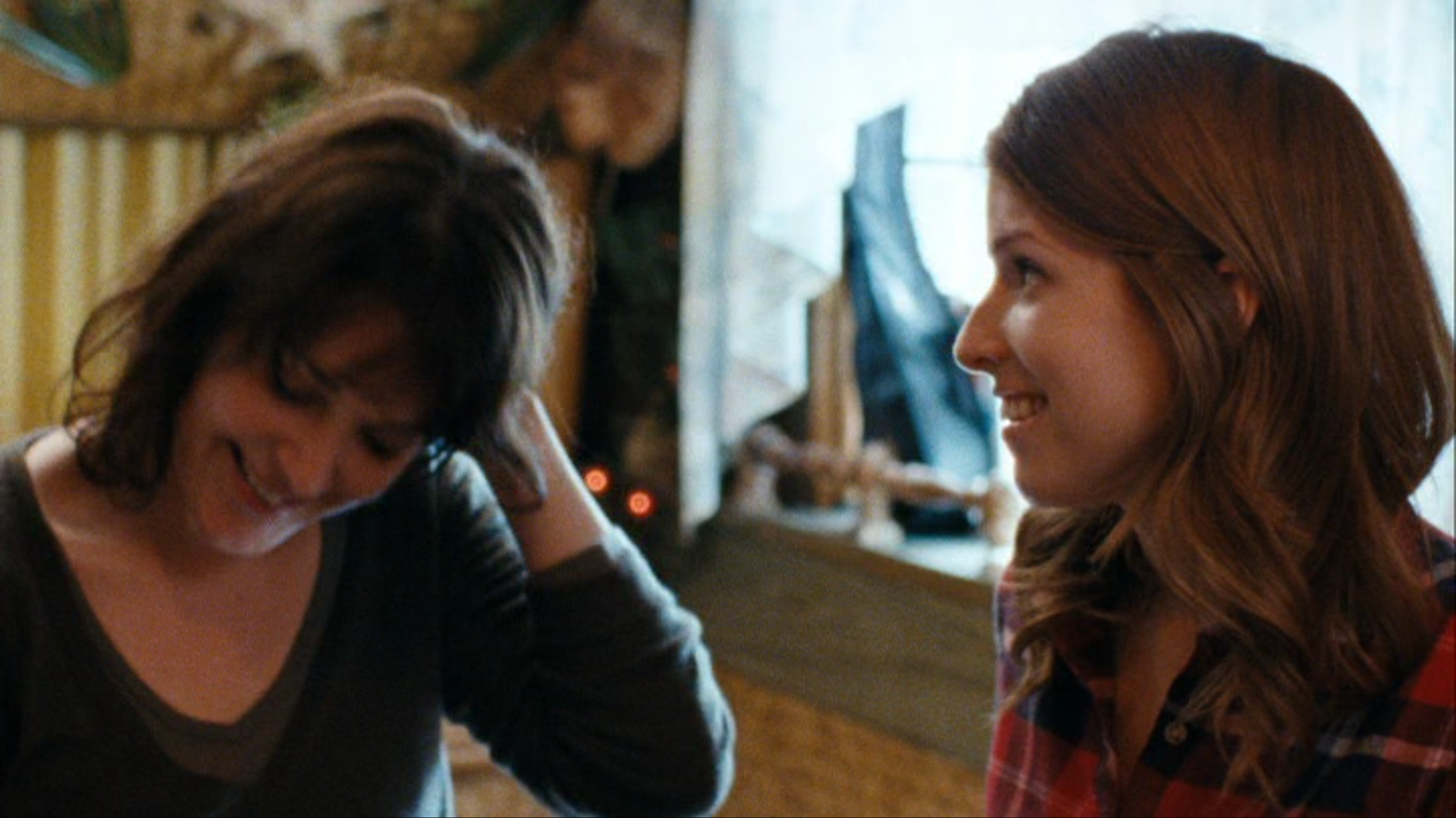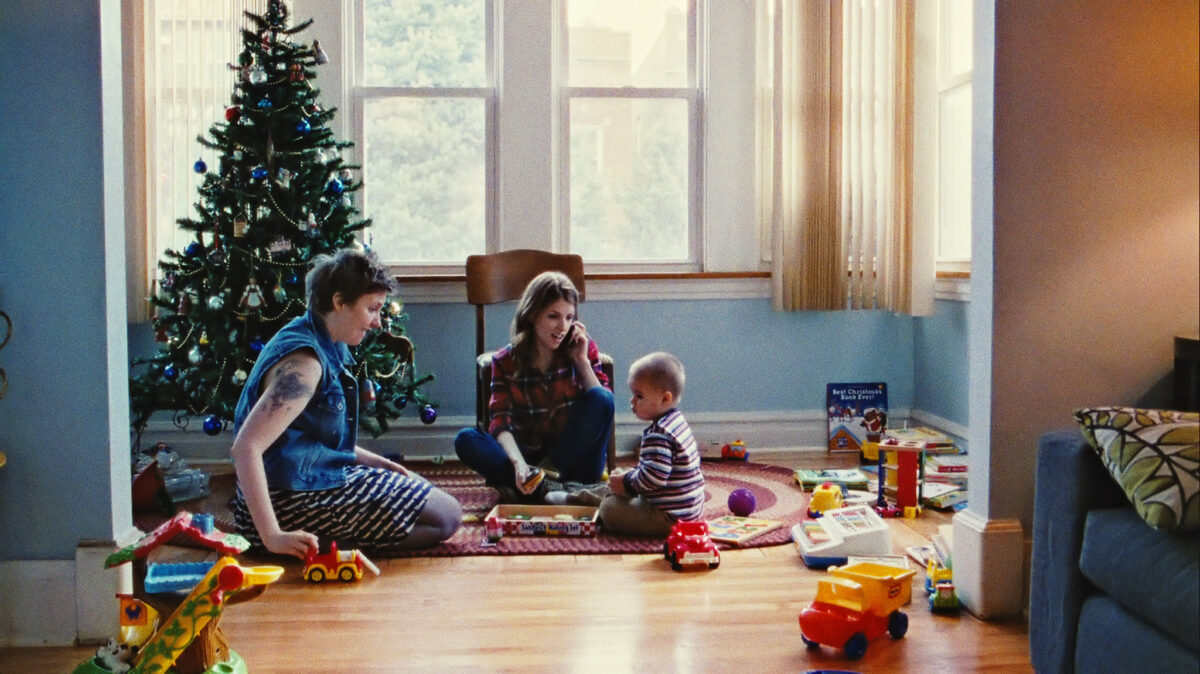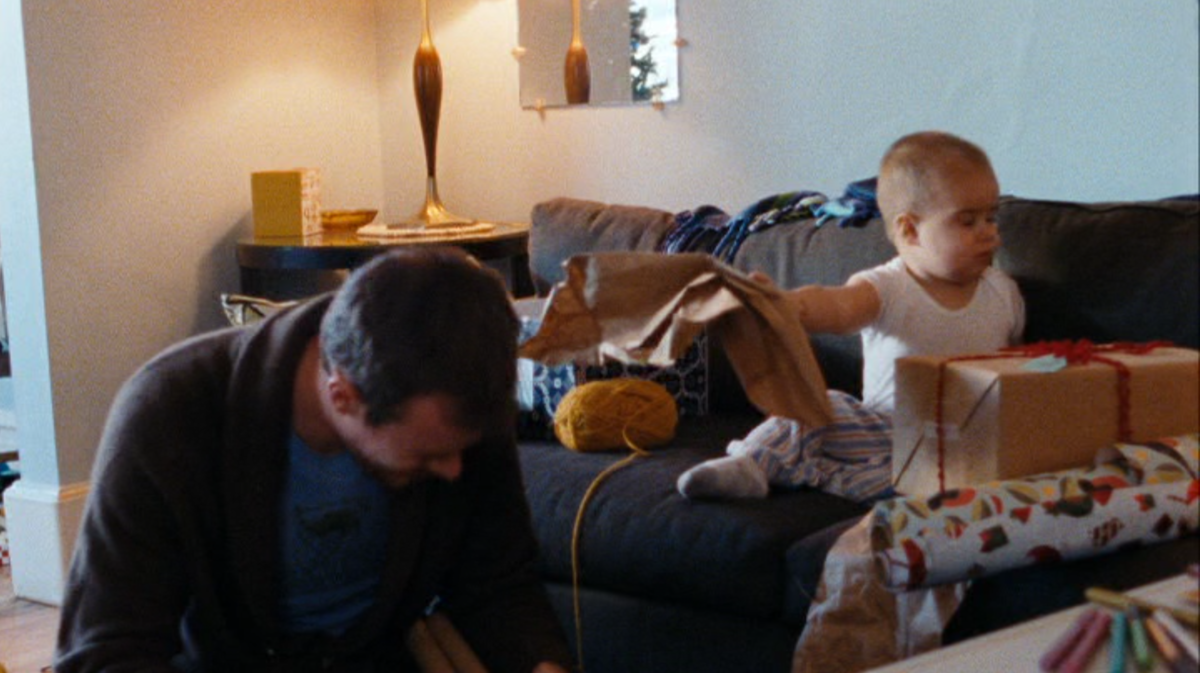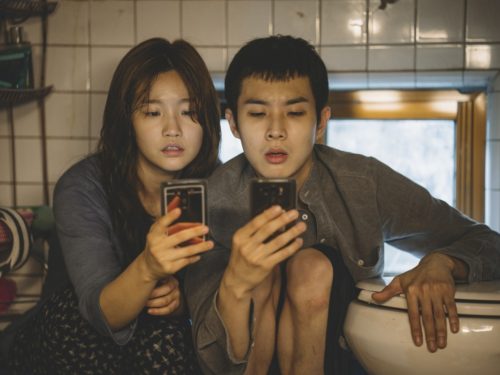Swanberg’s 2014 holiday-set film is a nuanced, modern affirmation of love and finding your place in the world
You can have your Wonderful Life, your Miracle on 34th, your litany of hyper-palatable Hallmark movies. For me, Happy Christmas is the seasonal favorite that warms my heart until it’s boiling over into sweet tears. Joe Swanberg’s Happy Christmas (2014) loves the imperfection of humanity in all its terrible discomfort and beautiful intimacy. The film cares deeply for its characters and they care even more for each other.
I feel like I’m home when I watch this movie, but it’s not the home of my childhood — it’s the softer ground I found to fall on as I stumbled my way through my chaotic first decade of so-called “adulthood.” My respite was with my brother, Jason, and his partner, Lucy. For Happy Christmas’ Jenny (Anna Kendrick), it’s a post-break-up stay with her brother, Jeff (Swanberg), his wife, Kelly (Melanie Lynskey), and his son, Jude (Jude Swanberg).
Happy Christmas is a small movie in every way. It’s not action heavy or even plot heavy. It has six characters and runs less than 90 minutes. This film feels warm and completely lived in — literally a homegrown movie. Swanberg’s script was based on recent events from his own life, the film was shot in his home in Chicago, and his toddler son plays his on-screen child. And although young Jude Swanberg gives us an adorable, scene-stealing performance, the focus of Happy Christmas is on a second childhood that many of us experience. Kendrick’s Jenny, a 27-year-old little sister, is in tumultuous transition. Her delightfully awkward performance, filled with quiet moments of painstaking self-consciousness, reminds that, for many of us, our twenties may be the most tender age of all. It’s a stage where we’re supposedly past the point of needing care, but most desperately do, while facing existential crises and harsh realities with an unclear sense of who we’re allowed to turn to anymore. After home is no longer defined by where our legal guardians reside, we have to find for ourselves where we belong. We find Jenny in these vulnerable days between shelters.
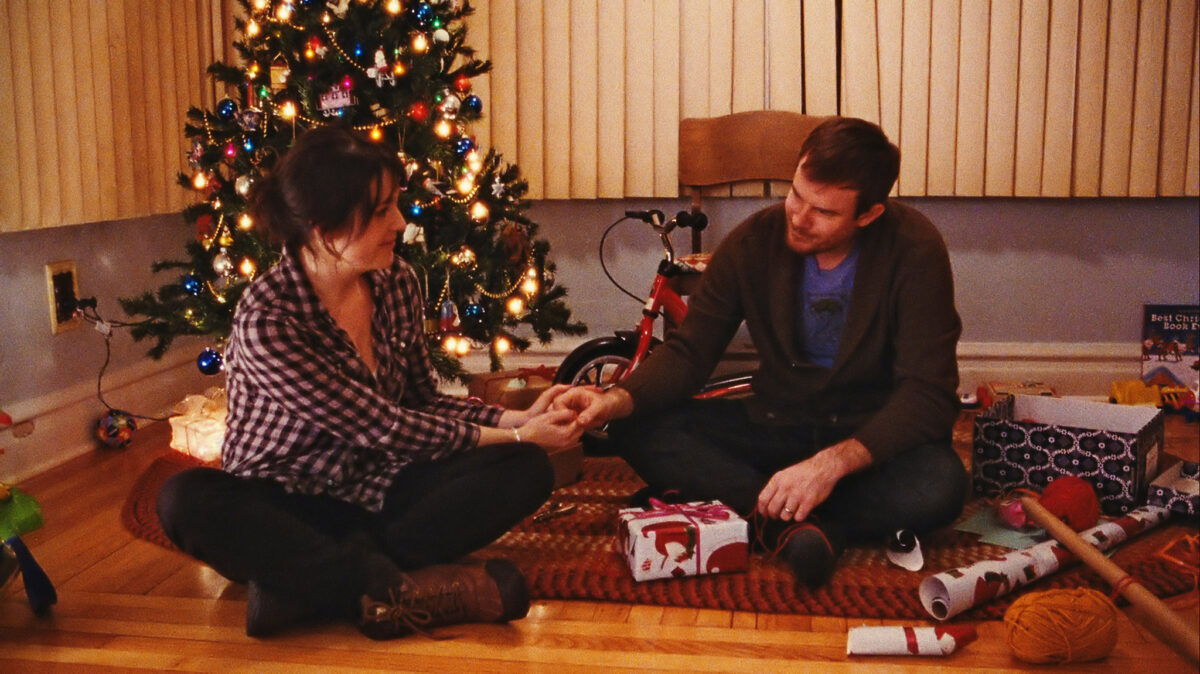
After Jenny’s first dinner with Jeff and his family in Chicago, she’s about to leave for a party and realizes her sister-in-law is doing the dinner dishes. Jenny tries to figure out if she should help before leaving with her friend, like a teenager asking if they have to do a chore before going out. She is unsure of her role. Later in the night, Jenny sits in a room with other young adults, passing a joint and talking about what kind of person she wants to be when she grows up.
Jenny:
And I don’t want to be one of those people
that continue to do the same kind of stuff.
You know what I mean?
No?
That’s OK.
The musings feel childlike, but also vital; the questions of who you want to be, the kind of life you want to live. Jenny is uncertain of herself. She doesn’t expect anyone to ‘get’ her and she’s unsure whether people at the party are being genuine in their kindness or just polite. Her friend Carson (Lena Dunham) asks her if she’s having a good time and she replies, “Your friends are so nice. Or maybe they’re just being nice.”
Later in the night, a very drunk Jenny passes out on the host’s bed. Carson tries to wake her up and Jenny literally acts like a toddler, kicking and going limp noodle, refusing to move. Carson ends up having to call big brother Jeff who has to scoop Jenny off the floor and carry her to the car. Is it the sheer discomfort of being in that unsure age that makes us lack impulse control — should we reach for any pleasurable sensory input to cut through the din of uncertainty? Is it an unspoken compulsion to see if someone will take care of us if we make ourselves need it? Or is it just the foolishness of youth? Regardless, the discomfort in Happy Christmas proves key to emphasizing the significance of when you do feel true acceptance — the kind that can only come after someone sees the sides you’re less proud of but thinks you’re worth it anyway.
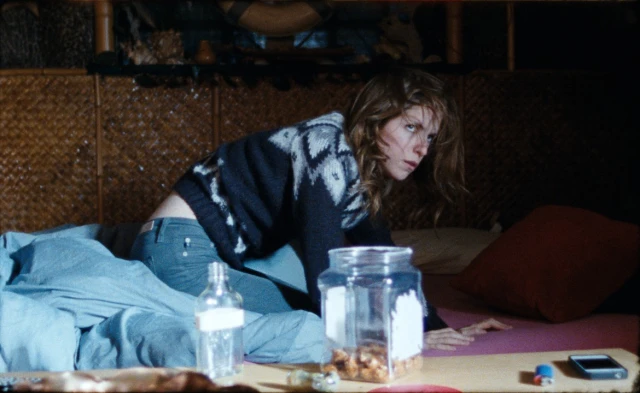
Swanberg’s reliance on his actors to improvise most of the dialogue serves this film particularly well. Instead of a traditional script, Swanberg created a 15-page outline with no written dialogue. The result is a collection of hyper-naturalistic conversations and a very real tension created through family conflict. We are not given scripts to follow when we fuck up in real life, so Jenny doesn’t get the benefit of one either. Jenny’s embarrassment is tangible as she tries to explain to Kelly that her drunken ordeal was a one-time thing. She struggles to balance the desire to downplay the mistake as no big deal with trying to assuage the mother’s fear that it will be recurrent behavior.
During this first conflict, we find a more guarded Kelly. She’s older than Jenny but, more importantly, we find Kelly in a very different phase of life. In motherhood, Kelly is finding her own challenges of disequilibrium and reevaluation of self. An author, with one novel under her belt, she’s found herself with a ‘new job’ that’s 24 hours a day and scant time to write. With Kelly, we are presented with the pressures of women to be “everything.” It’s actually one of the first things Jenny says to Kelly when she walks in the door: “And you cooked for me? You’re everything.”
As their relationship develops, we see how each of these women take the time to truly see each other. They each create space for the other to explore her authentic voice, to delve into what they truly want and think. Although much of what they encounter is universal, their relationship does highlight struggles that are specific to being a woman. It is easy to call Happy Christmas a feminist film and this is another place where Swanberg’s improvisational style serves well. Of women and their stories, Swanberg has said, “I let them speak for themselves and I listen; that’s the extent of the secret there.”
This is another way in which the film has done for its characters what the characters do for each other. Swanberg left blank pages for his actresses to explore these ideas about the pressures and choices of women. Within the world of the movie, Jenny and Kelly and, to some extent, Jeff, all make room for each other to become more present versions of themselves. The film shows us a modern affirmation of love as holding space for self-actualization.
There is a turning point during a conversation in the family’s basement tiki bar. Kelly gives Jenny a second chance at babysitting after her drunken mistake. When she returns, Jenny gives Kelly a chance to play a role other than that of protective mother. Jenny and Carson convince Kelly to have a drink and she opens up about the struggle of balancing her sense of self, her writing career, and motherhood. Sure, drinking may land Jenny on the naughty list, but it’s also a tool for bonding, encouraging family to shed expected roles and share deeper truths. There is a balancing act present in Happy Christmas: What makes its characters feel alive? What is it to be responsible? How can they tend to both of these priorities?
It is in this conversation at the bar that Jenny begins to invite Kelly back to herself and, not to be undervalued for a moment, it’s where they start having fun together. In their own ways, each of these women are grappling with what they want life to look like. Kelly speaks about the pressure to be everything and the complicated idea of women having it all.
Kelly:
Having it all is a very dangerous concept…
because that just means I have to do everything.
It’s the truth. I mean, that’s just how the world works.
Jenny recognizes her struggles, her talent, and her potential. She becomes a spirited supporter of Kelly. During the conversation at the tiki bar, she swoons over Kelly’s first novel and proposes that maybe someday she’ll make more money than her filmmaker husband with her work.
Related: Read about Frank V. Ross’ holiday season-set Tiger Tail in Blue (2012)
The conversation inspires Kelly to ask her husband for a Christmas gift — time away from her kid to write. He sets her up with an unused office space and takes on more time with Jude himself. Jenny pitches the idea that Kelly should write a commercially marketable erotic novel to make money so that she can afford to continue to carve out time for her more personal writing. They start to work together on the novel and they become closer. Jenny, who was guarded about the details of her breakup, opens up to Kelly. Their relationship reveals what’s valuable and special in both of them even if neither of them can actually be that looming embodiment of everything. As Christmas approaches, Kelly and Jenny share a squirming and tender moment where Kelly tells Jenny that her “crazy excitement” has helped her rediscover her own excitement and vitality. Jenny is awkward and sweet, staring at her phone, as she admits that she cares about Kelly, too. The two give each other the grace to change, to reveal themselves as human beings made of flaws, gifts, and stardust.
Happy Christmas is a film about the beauty that follows grace given to our loved ones. It is a story that loves second chances and gives its characters room to grow. When Jenny wakes up hungover after her first night in Chicago, the babysitter Kevin (Mark Webber), invites her to the park instead of leaving her behind. He gives her another chance to show care for her nephew. It’s a moment where she could have been left to dwell in her mistake but the film gives her another chance to show up. It’s the beginning of a subplot where Jenny and Kevin develop a romantic relationship. Jenny continues to fumble through clumsy mistakes but also has moments where she seems to be more confidently asserting herself and finding her personal limits. The new relationship is full of moments of simple connection that serve as little windows into Jenny’s evolving sense of self.
Christmas is a time that can be wrought with harsh messages of judgment — who has been naughty or nice and, let’s be real, Jenny would wind up on a lot of peoples’ naughty list. This movie lovingly pokes at its characters’ shortcomings rather than allowing them to be defined by them. When Kelly is having a strong reaction after Jenny’s initial mistake, Jeff asks playfully, “Do you remember how you used to act?” Later, in response to Kelly saying “she doesn’t seem like a responsible person,” Jeff says, “she’s not a responsible person,” but still urges his wife to give Jenny a second chance. The idea of being a responsible adult is often used with the connotation of being “bad,” but this film lets go of that broadly painted connotation and lets Jenny be both — not always responsible, yet caring enough to show up to babysit. Perhaps more subtly, this interaction shows Jeff inviting Kelly to reflect on her own reactivity. In nudging her to give Jenny a second chance, Jeff also helps Kelly create her own opportunity to recognize the limitations of her perspective and become more present with Jenny.
When we’re kids, we are beloved in transition — in the mess of growing. We aren’t expected to have arrived at some destination of personhood in order to be valued. When we find ourselves as adults, still feeling ill-defined or immature in the wake of bad decisions, we’re faced with the scariest question: Am I truly loved? And, scarier still, do I even deserve to be? It is in the face of this question that Kelly goes to find Jenny at the end of the film. Jenny has made a bigger mistake this time; drunk and emotionally wrecked after a date with Kevin on Christmas Eve, Jenny returns home and passes out with a pizza burning in the oven. She fills the home with smoke and sets off the smoke alarms. She runs away without apology on Christmas morning, leaving Kelly hurt and worried. When Kelly finds her in the office where they have been working together, Jenny tells the truth that she has been “hiding” all day, covering part of her face with her hands like a child confessing.
It’s a quiet scene, with as much said with demeanor as words. Kelly meets Jenny not with condemnation or shame, but with humility of her own. Earlier she unfastened herself from her initial reactions and their limiting perspective. As a result, she has experienced a meaningful friendship and in this last small but very impactful moment, she leads with that openness.
Traditional Christmas movies either want you to learn your lesson and choose to be good before you are rewarded with your warm, cozy ending, or sell you a brand of acceptance that is both blind and bland; one size fits all of God’s children. Happy Christmas makes no such demands nor does it simply turn the other cheek. The family in Happy Christmas lovingly call each other on their mistakes and the film does the same for them as characters. The result is a nuanced understanding of acceptance. It feels solid. It feels like a much deeper sense of home.
Stream Happy Christmas on Amazon Prime
Purchase Happy Christmas on DVD
Stay up to date with all things Split Tooth Media and follow Snow on Twitter
(Split Tooth may earn a commission from purchases made through affiliate links on our site.)

